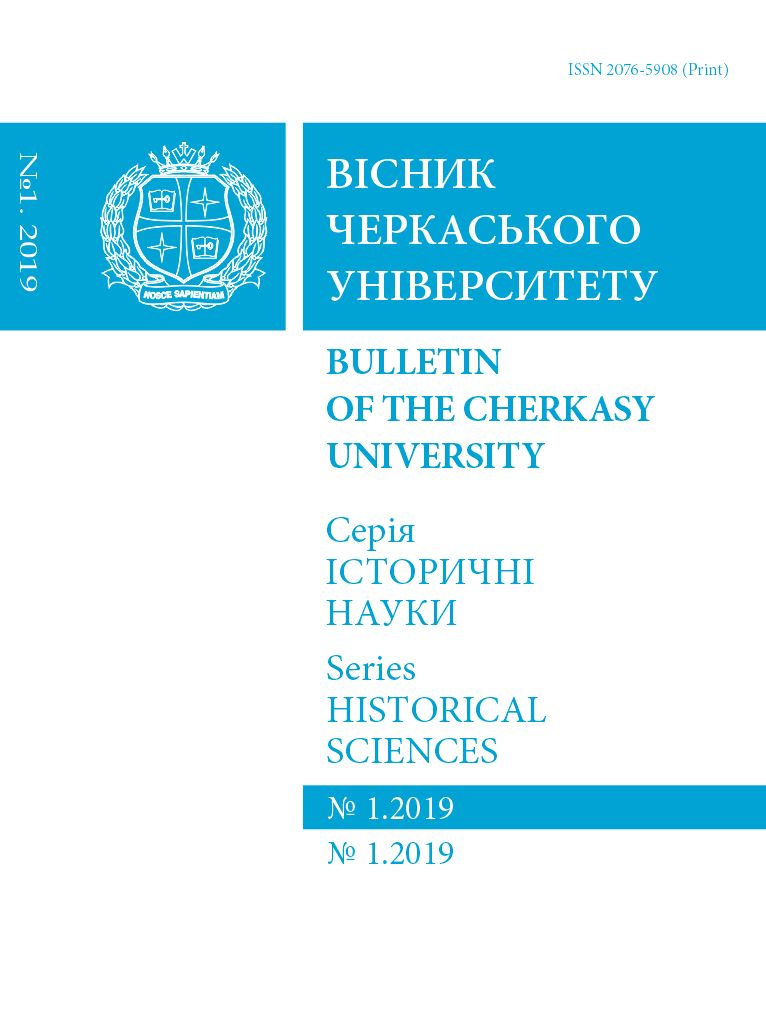Peculiarities of implementation of educational reforms in Japan after the Second World War
Main Article Content
Abstract
Abstract. Introduction. The article considers the stages of educational reforms implementation in the postwar period and their impact on schooling. Special attention is paid to the study of educational ideas in the pre-war and post-war period. The activities of the Japanese government and the occupation regime to eliminate illiteracy among various segments of the population are considered. A special role is given to the issue of military influence withdrawal from school education. The processes of introduction of “progressive education” by the US occupation regime, which played a key role in the reform process, have been updated.
Purpose. The aim of the proposed article is to study the educational reforms in the postwar period in Japan.
Results. Summarizing the research of historians, we can draw our own analytical conclusions about the development of the educational system in Japan. The processes of implementation of school reforms in the postwar period are studied. The role and influence of the occupation regime, its introduction of changes in schooling are determined.
Conclusion. Changes in Japan’s education policy in the postwar period have yielded positive results, as evidenced by the increase in the number of educational institutions in the country. During the occupation period, the basis of the established regime was the introduction of democratization and demilitarization of the country. Education was one component of such a plan. The introduction of reforms in education has made it possible to achieve changes in the ideological views of the younger generation. The key role in the new educational concepts was played by the US missions in Japan, which operated there during the 1946-1950s. The reform of the Japanese educational system became a kind of springboard for further progressive changes in the country.
Article Details
References
Amano I. Education and Examination in Modern Japan – Tokyo 1990. – 234 p.
Anderson R. Education in Japan: A Century of Modern Development. – Washington 1975. – 411 р.
Baerwald H. The Purge of Japanese Leaders under the Occupation. – California 1959. [Електронний ресурс] – Режим доступу: https://www.cambridge.org/core/journals/american-political-science-review/article/abs/the-purge-of-japanese-leaders-under-the-occupation-by-hans-h-baerwald-berkeley-california-university-of-california-press-1959-pp-111-225/479E63615C05F0B2C1E1456766542F4B
Beauchamp E. History of education society // The development of Japanese policy. Vol. 27, No 3. – Cambridge 1987. – P. 304 – 324.
Miki Y. Ishikida. Japanese education in the 21st century. – New York, 2005. – 349 р. [Електронний ресурс] – Режим доступу: https://books.google.com.ua/books/about/Japanese_Education_in_the_21st_Century.html?id=Jv-xExHBhIMC&redir_esc=y
Yasuo S. Education in Japan: past and present.. [Електронний ресурс] – Режим доступу: https://www.nier.go.jp/English/educationjapan/pdf/201103EJPP.pdf
Кеннан Д. Дипломатия Второй мировой войны глазами американского посла в СССР Джорджа Кеннана / Пер. с англ. – Москва: Центрполиграф, 2002. – 479 с.
Anderson R. Japan: three epochs of modern education – Washington, 1959. – 230 p. [Bulletin U.S. Department of Health, education and Welfare. – 1959. – №11.] [Електронний ресурс] – Режим доступу: https://files.eric.ed.gov/fulltext/ED045543.pdf
Tokutake Toshio. The Post war History of Japanese. – Tokyo, 1995.
Kinichi Toda. Kokumin Gakkф: Kфkoku no Michi. – Tokyo: Yoshikawa Kobunkan, 1997.
Yamanaka, Hisashi.. Bokura Shфkokumin. – Tokyo: Kфdansha, 1989.
References
Amano, I. (1990). Education and Examination in Modern Japan. Tokyo (in Eng.).
Anderson, R. (1975). Education in Japan: A Century of Modern Development. Washington (in Eng.).
Baerwald, H. (1959). The Purge of Japanese Leaders under the Occupation. California. Retrieved from: https://www.cambridge.org/core/journals/american-political-science (in Eng.)
Beauchamp, E. (1987). History of education society. The development of Japanese policy. Vol. 27, No 3. Cambridge. (in Eng.).
Miki, Y. Ishikida. (2005). Japanese education in the 21st. Retrieved from: https://books.google.com/books/about/Japanese_Education_in_the_21st_Century.html?id=Jv-xExHBhIMC&redir_esc=y (in Eng.).
Yasuo, S. (2004). Education in Japan: past and present. Retrieved from: https://www.nier.go.jp/English/educationjapan/pdf/201103EJPP.pdf (in Eng.).
Kenan, D. (2002). Diplomacy of World War II through the eyes of US Ambassador George Kennan. Boston. (in Russ.).
Anderson, R. (1959). Japan: three epochs of modern education. Washington. Bulletin U.S. Department of Health, education and Welfare. № 11. Retrieved from: https://files.eric.ed.gov/fulltext/ED045543.pdf (in Eng.).
Tokutake, T. (1995). The Postwar History of Japanese. Tokyo. (in Eng.).
Kinichi, T. (1997). Kokumin Gakkф: Kфkoku no Michi. Tokyo. (in Eng.).
Yamanaka, H. (1989). Bokura Shфkokumin. Tokyo. (in Eng.).

